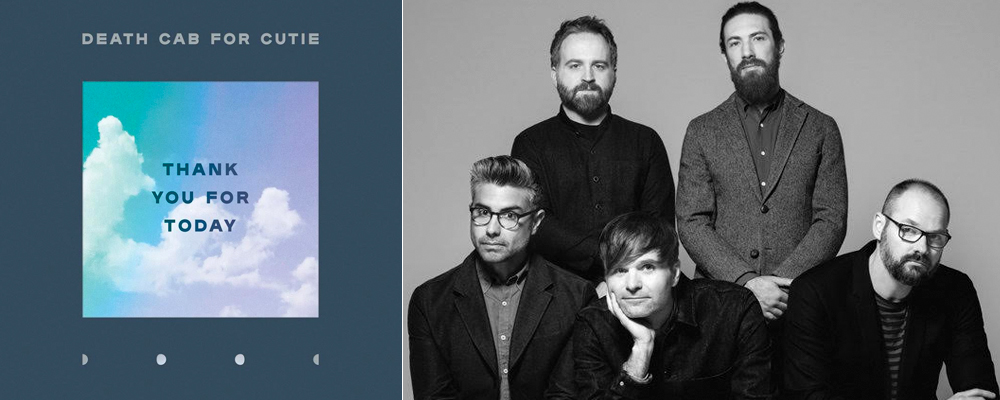Different Band, Different World: Death Cab For Cutie Release ‘Thank You For Today’
Adi Mehta
Some musical styles are synonymous with particular decades — disco, synth-pop, grunge. The closer you are to the time of a style’s peak, the harder it is to pinpoint it as a passing phenomenon, as it creeps up on you and passes as something of the norm. Death Cab For Cutie emerged in the mid aughts and stayed there. There was a moment when bands suddenly popped up around the world, all baring what seemed to be the very same singer. If there were only a linguistic term to describe this entity, the profusion of artists meeting the label during the era would constitute something like a social rights movement, as it involved a formerly unheard group suddenly becoming ubiquitously vocal. So you have Death Cab For Cutie, now returning in 2018, after a seven-year hiatus, and without founding member and producer Chris Walla, with “Thank You For Today.” For those who bought into the emo craze, it’s a nurturing album, for you to curl up and reminisce about periods slightly too recent to afford proper appreciation in the realm of nostalgic fare.
The album is largely concerned with nostalgic themes, with singer Ben Gibbard reflecting on the changing world around him, and reminiscing about past times. It’s fitting that the band sounds a bit as if it were cryogenically frozen, and finally thawed out. This isn’t necessarily a bad thing if it’s your cup of tea. There are two new members, Dave Depper and Zac Rae, both sharing guitar and keyboard duties, and their contributions result in a somewhat expanded sound. There’s more of an ‘80s quality to the guitar work than ever before. It sounds as if the guitarists taught themselves to play listening to The Cure. They are constantly fiddling away with the type of melodies that defined that era’s guitar music, sounding as if they have their heads permanently tilted in their best dreamy poses. The vocals, on the other hand, make it ever clear that you are listening to no other band than Death Cab.
Radiohead’s Thom Yorke once rather dismissively described Coldplay as “lifestyle music,” and the term might be even better suited for Death Cab. This is music for people who feel too outcast to bleat in chorus with the herd, but too normal to do anything too edgy. In fact, the music is largely defined by its utter lack of edge. Everything is toned down, and it’s a rather drab affair at large. Of course, one hallmark of the “indie” aesthetic is a certain distaste for professionalism, and an embrace of “amateur” sonic sensibilities. However, most bands that readily claim the “indie” label have some fresh quality to their sound that warrants this posture. In the case of Death Cab, the only quality is a sort of tepidness. It’s pop music for people who fear coming across as too pop, lest they would be deemed tasteless, and ironically coming across as rather tasteless themselves.
In “I Dreamt We Spoke Again,” Gibbard wonders, “Is anything, is anything the way it used to be?” The line encapsulates the album, and the answer is clear: Yes, Death Cab For Cutie is the way it used to be. “Summer Years” tackles the universally the topic of lost loves, with the divorced Gibbard getting personal, in lines like, “And I wonder where you are tonight / If the one you’re with was a compromise / As we’re walking lines in parallel / That will never meet and it’s just as well.” Such bits are arguably the most memorable parts of the album, as they put their finger on something universally relatable, with a certain candidness. Another charm of the album is the little details of lyrics, as in “When We Drive,” in which Gibbard sings, “I like the way your hair tangles / The way your sun tan’s only on one side.” His preschool boys’ choir singing style fits well with such observations.
“Gold Rush” is an especially effective survey of “gentrification,” with the lines, “ We kissed beneath the street lamp light / Outside our bar near the record store / That have been condos for a year and more.” Lackluster as many of the other lyrics may be, Gibbard really nails it here, by picking a record store and condos, moreover by recasting the term, “gold rush,” as that’s literally what it is. The Death Cab fan demographic, who might themselves occasionally encounter criticism for the gentrification phenomenon, still can’t help but be thrown off by the lifeless, soulless cookie-cutter condo world assembling itself around them. If you could sigh using words, Gibbard has done it. In his own words, from “Your Hurricane,” “It’s a tired refrain you’re singing over and over again.”
The album concludes with “60 and Punk,” a song about being disappointed by a former hero. This is a ripe topic, with so much promise in the title, as we’re all a bit sick of the 60 year-old East Village dweller who dons his Sid Vicious vest and lurks in the streets as if it’s still ‘77. Unfortunately, Gibbard’s wording doesn’t quite meet the mark. With great pomposity, he declares, “It’s nothing righteous being 60 and punk.” Depending on your definition of “punk,” it can actually be very righteous. The “punk” ideal, silly as it may be, translates to a philosophy of subversion, a spark of attitude. It’s no surprise that Death Cab For Cutie would be opposed. “Thank You For Today” is an album for the aging indie kid, and as such, it’s a great album, as it successfully hones in on that niche.
“Thank You For Today” is available Aug. 17 on Apple Music.

